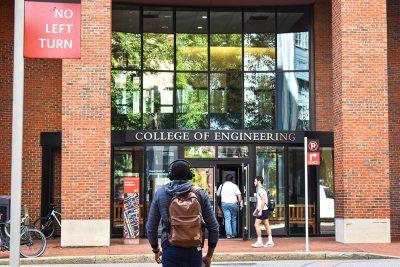
Boston University’s College of Engineering received recognition for its leadership in fostering diversity on Sept. 12. The American Society for Engineering Education, a non-profit professional association, awarded ENG this status as part of its Diversity Recognition Program.
To apply successfully, a school must have signed and carried out ASEE’s Deans Diversity Pledge. The document focuses on developing a Diversity Plan that defines the meaning of and acknowledges the need for inclusivity. Such a plan would be evaluated through various means, such as surveys, to hold the institution accountable.
Eligible schools must also establish at least one activity for K-12 or community college students with the aim of increasing future diversity in their engineering classrooms. In line with this criteria, BU offers the U-Design summer program for young scholars entering grades six through nine.
Christos Cassandras, the head of the Division of Systems Engineering at ENG, said although the level of diversity in the engineering field has shifted for the better throughout the years, change is slow because the historic roots of underrepresentation run deep.
“That’s something that has to change systematically, and it goes back to high school and probably elementary school,” Cassandras said. “And that’s why we have all these outreach activities in the College of Engineering to try to reach out to those populations and have some positive effect.”
Through ENG’s Technology Innovation Scholars Program, undergraduate engineers at BU can also work directly with middle and high school students. Trained and paid Inspiration Ambassadors for the program give presentations on the importance of engineering within modern society.
The application for the Diversity Recognition Program also requires an institution to support an established infrastructure capable of supporting diverse populations. At BU, the National Society of Black Engineers seeks to increase the number of academically and professionally successful black engineers. Meanwhile, BU’s chapter of the National GEM Consortium aims to boost participation of underrepresented groups in graduate STEM studies.
In signing the Diversity Pledge, ENG has also promised to increase the representation of women and other minority groups in its faculty. Cassandras links the necessity of this to having aspiring engineers see role models they can relate to.
“It’s very difficult, for example, for a woman engineer to be inspired, motivated and mentored by a non-woman mentor, as compared to a woman mentor,” Cassandras said. “We all respond better to people who are real peers and have experiences which are shareable.”
Ousama A’Amar, a biomedical engineering lecturer who arrived in the U.S. after growing up in the Middle East and then pursuing graduate study in France, said diversity is important for bringing ideas together.
“When I started teaching here, I saw that there’s progress in increasing the diversity level at this institution in particular and also at the College of Engineering,” A’Amar said. “In general, diversity is really very important, because you can have a mix of ideas from different people from different backgrounds … to develop new products and collaborate with other people who are in the field.”
Derek Barbosa, a sophomore in ENG, said he grew up in a highly diverse Boston community and finds the classrooms at BU similar in that aspect.
“I went to school with 2,000 kids who all had different walks of life and came from different parts of the country and even the world,” Barbosa said. “And so in the College of Engineering, it kind of makes me feel a little more at home knowing that there are other people’s experiences that you could learn from and you know, gain insight into.”
Abbigale Shi, a freshman in ENG, said the college feels diverse but there is room for improvement in some areas.
“I come from a pretty diverse school myself and there wasn’t a drastic shift or change when I transitioned schools,” Shi said. “So it feels pretty diverse to me and obviously I feel like there are places that could be worked on and every school should work on that. And I also don’t know everybody yet so I don’t want to assume anybody’s race or background.”
Chirasmita Kompella, a sophomore in ENG, said her college has shown her a diverse environment so far, but that lack of diversity is not so much a school-specific issue as a wider, institutional one.
“I feel the diversity and I feel a lot of acceptance with it. I haven’t felt like I don’t belong or that other people don’t, but I can only speak for myself, obviously,” Kompella said. “I think it’s a general problem that’s obviously very prevalent right now, but there are overall less girls. And you don’t really notice that often until we go into smaller classes. And that’s just something that, overall, I think that they’re already trying to combat.”






















































































































